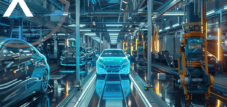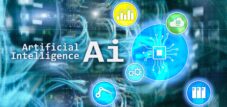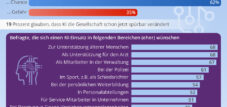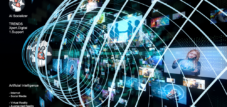Future visions of artificial intelligence: Will AI improve or complicate our lives? A look at the next 3 to 5 years
Language selection 📢
Published on: July 12, 2024 / update from: July 12, 2024 - Author: Konrad Wolfenstein
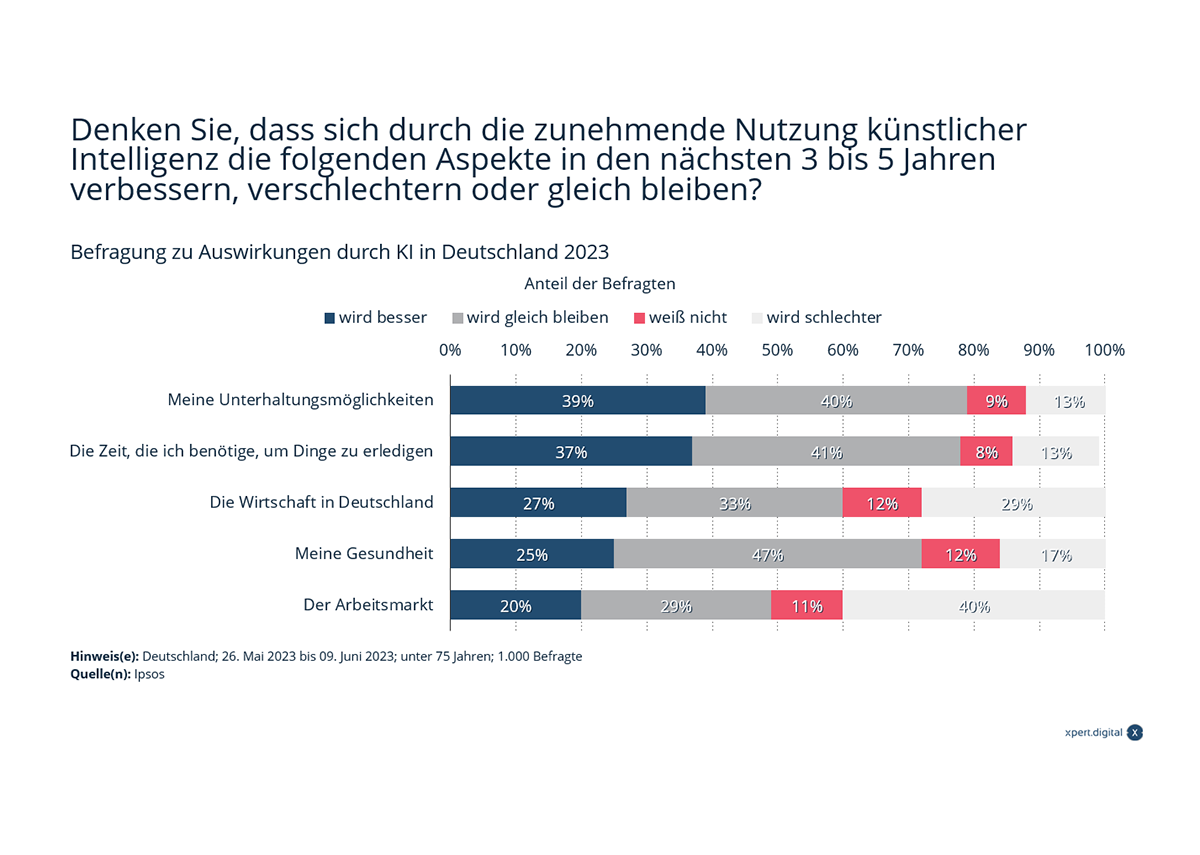
Technological forecasts: Will AI improve or worsen our future? Artificial intelligence - a look at the next 3 to 5 years - Image: Xpert.digital
🤖📊 challenges through artificial intelligence in Germany
🤖 Artificial intelligence (AI) develops rapidly and already has a significant impact on various aspects of everyday life and the economy. In Germany, as well as worldwide, people face the challenge of adapting to these technological changes. A survey by IPSOS, which was carried out from May 26 to June 9, 2023, illuminates the views of the Germans on the effects of increasing use of AI in the next three to five years. The results of this survey provide insights into the expectations of the population with regard to entertainment, efficiency in everyday life, economic development, health and the labor market.
📺 entertainment options
The entertainment options are an area in which 39% of those surveyed believe that the situation will improve. Only 13% expect a deterioration, while 40% think that nothing will change and 9% are unsure. This optimism could be due to the already visible progress in areas such as video games, streaming services and personalized entertainment. AI-based recommendations on platforms such as Netflix and Spotify improve the user experience through tailor-made content, which increases the satisfaction of the user.
⏰ Efficiency in everyday life
Another aspect that is influenced by AI is the time that people need to do tasks. Here, 37% of those surveyed believe that their efficiency will improve, while 13% expect deterioration. 41% believe that there will be no changes and 8% are unsure. AI-supported assistants such as Siri, Alexa and Google Assistant can make routine tasks easier, set memories and provide information quickly what makes everyday life more efficient.
📈 economic development
The effects of AI on the economy in Germany are rated more mixed. Only 27% of the respondents believe that the economy will benefit, while 28% expect deterioration. 33% think that nothing will change and 12% are unsure. This skepticism could be due to fears of loss of workplace and unequal distribution of prosperity. At the same time, however, AI also offers the potential for economic growth through innovations and efficiency increases in various industries.
🩺 health
In the health sector, 25% of the respondents expect an improvement by AI, while 17% fear deterioration. 47% believe that nothing will change and 12% are unsure. AI can bring significant advantages in medicine through improved diagnostics, personalized treatment and more efficient management of health data. Nevertheless, there are also concerns about data protection and the quality of AI-based decisions.
💼 labor market
The labor market is the area in which most respondents (40%) expect deterioration, while only 20% see an improvement. 29% believe that nothing will change and 11% are unsure. The concern for loss of jobs through automation and the use of AI is widespread. At the same time, however, there is also the potential for new jobs and professional fields that arise from the integration of AI.
🤖💬 Diverse opinions: Germany's view of the future of the AI
The survey shows that the opinions of the Germans on the effects of AI are diverse and often contradictory. While optimism prevails in some areas, the concerns and uncertainties predominate in others. It is clear that the acceptance and integration of AI in different areas of life must be carefully and responsibly designed in order to maximize the advantages and at the same time minimize the negative effects. Political decision -makers, companies and society as a whole have to work together to deal with these challenges and to make a positive future with AI.
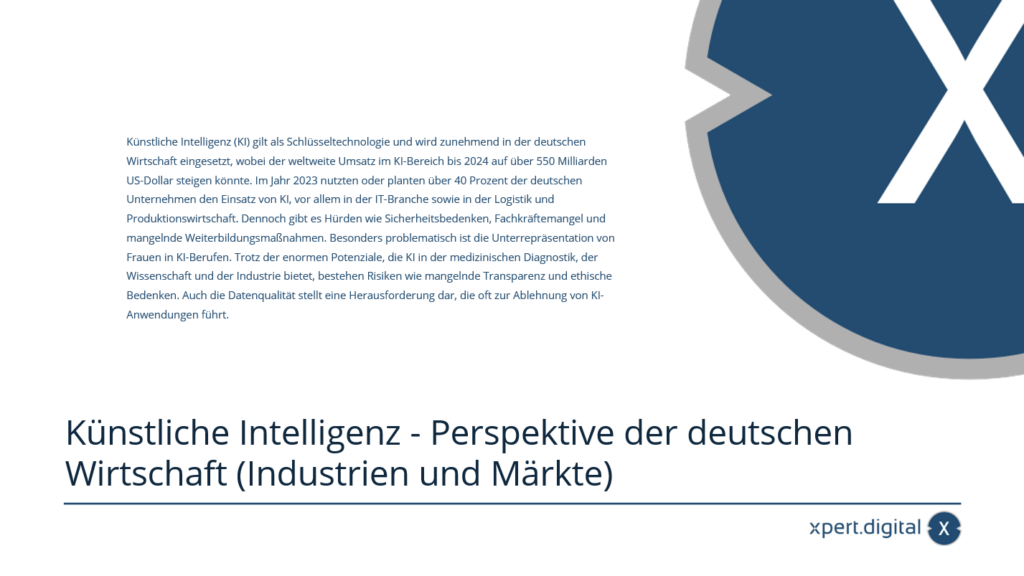
Artificial Intelligence – Perspective of the German Economy (Industries and Markets) – Image/PDF: Xpert.Digital
📣 Similar topics
- 🎬 AI in the entertainment: German expectations and concerns
- 🕰️ Efficiency in everyday life: How Ki could influence the life of Germans
- 📉 Economy and AI: Optimism and skepticism in Germany
- 🏥 Health sector: How AI could change German medicine
- 💼 Labor market and AI: Fear of job loss vs. New opportunities
- 🤖 AI integration: opportunities and challenges for Germany
- 🎮 Personalized entertainment: AI revolutionizes streaming and games
- 📈 AI and economic growth: German perspectives and forecasts
- 🛠️ AI assistant: increase in efficiency in everyday German life
- 🔮 Future of work: AI conditions in the German labor market
#️⃣ hashtags: #kiindeutschland #artificial debit #labor market #economy #gesundheitmitki
Our recommendation: 🌍 Limitless reach 🔗 Networked 🌐 Multilingual 💪 Strong sales: 💡 Authentic with strategy 🚀 Innovation meets 🧠 Intuition
At a time when a company's digital presence determines its success, the challenge is how to make this presence authentic, individual and far-reaching. Xpert.Digital offers an innovative solution that positions itself as an intersection between an industry hub, a blog and a brand ambassador. It combines the advantages of communication and sales channels in a single platform and enables publication in 18 different languages. The cooperation with partner portals and the possibility of publishing articles on Google News and a press distribution list with around 8,000 journalists and readers maximize the reach and visibility of the content. This represents an essential factor in external sales & marketing (SMarketing).
More about it here:
🤖 The effects of increasing use of artificial intelligence in the next 3 to 5 years
🤖 The rapid development and integration of artificial intelligence (AI) into different areas of life represents one of the greatest technological revolutions of our time. In view of which, many people arise the question of how this development will affect various aspects of our lives in the coming years. In the next three to five years in particular, significant changes can be expected that can have both positive and potentially negative effects. In the following, I will shed light on these aspects in detail, predict and analyze the possible changes as to whether these improvements, deterioration or stability of the current conditions could result.
🧑💼 Labor market and employment
A frequently discussed topic is the influence of AI on the labor market. In the coming years, this area will certainly continue to transform itself due to increasing automation. Jobs that include repetitive or routine tasks could increasingly be replaced by machines. Industries such as manufacturing, warehousing and even the service sector could be severely affected. For example, the use of AI not only optimizes production processes in the production, but the need for human labor is also reduced in certain areas.
Nevertheless, the penetration of the AI not only entails negative aspects. With the elimination of certain jtip types, new employment opportunities are also created. There will be an increasing demand for specialists who are able to develop, wait and improve AI systems. In addition, AI systems can increase productivity in many areas and thus create new economic opportunities. In medicine, for example, intelligent systems support doctors in diagnoses and treatments, which can increase both the quality of health care and efficiency.
📚 Education and training
Another important area is education. AI can create tailor -made learning programs and adaptive learning environments that respond to the individual needs of the learners. This could help improve educational results and better prepare learners for the future. Learning platforms based on artificial intelligence can analyze data to find out which methods are most effective for certain students and thus create personalized learning plans.
The role of the teachers will also change. Instead of mainly conveying content, they will increasingly act as mentors and coaches that support learners in using AI-supported learning tools. This could significantly improve the quality of the training and enable deeper, more individual learning experience.
🏥 Healthcare
The potential of AI is particularly evident in healthcare. The ability of AI systems to analyze large amounts of medical data in a short time could lead to previous and more precise diagnoses. A remarkable example is the use of AI in image analysis, such as X-rays or MRI scans, where she can already work with or even better than experienced radiologists.
In addition, personalized medicine and therapies could be improved by AI. By analyzing genetic information and other health data, specific treatment plans for patients who are more effective and less side effects can be developed. For example, cancer therapy could be revolutionized by precisely matching the treatment to the genetic properties of the tumor.
🔒 Privacy and security
With the increasing spread of AI, however, there are also considerable challenges in terms of data protection and security. AI systems collect and analyze huge amounts of data, which leads to considering privacy and protection of personal data. It is crucial to develop robust security protocols and legal regulations to prevent the abuse of these technologies.
Another threat is the use of AI in the area of cyber crime. Cybercriminals could use AI to carry out advanced attacks that are more difficult to recognize and ward off. At the same time, however, AI can also be used to improve cyber security by recognizing patterns of cyber attacks early and initiating corresponding countermeasures.
⚖️ Social and ethical aspects ⚖️
Extensive social and ethical questions are also associated with the spread of AI. A central question is that of responsibility. When AI systems make autonomous decisions, how is responsibility regulated for their actions? This applies in particular to the areas of autonomous driving and decision -making in medicine.
The ethical dimension also includes fear that existing social inequalities could be reinforced by AI. For example, the advantages of AI-controlled health services could mainly benefit wealthier population groups and further disadvantage poorer sections of the population. It is crucial to create political and regulatory framework that promote fair access and fair use of AI.
🤖 interactive and social technologies
Another aspect is the change in our social interactions by AI. With intelligent assistants such as chatbots and voice -controlled systems, we are increasingly interacting with machines with machines that were previously reserved for human interactions. This could fundamentally change the way we communicate. For example, social robots in geriatric care could be used to support older people and to do society. Although this offers many advantages, there is also a risk that human contacts and empathy will take a back seat.
Another example is social networks that increasingly rely on algorithms to personalize content. While this can improve the user experience, it also harbors dangers such as the reinforcement of filter bubbles and the spread of misinformation. AI could act both as a problem solver and as a problem person.
🎨 Creativity and culture
Interestingly, AI also influences creative processes and culture. Intelligent algorithms can create works of art, music or literary texts that can hardly be distinguished from the works of human artists. These technologies open up new opportunities for artistic expression and creative collaborations. An example of this is the music industry where AI is used to compose new melodies or remix existing music.
However, the question of the extent to which such mechanically generated works can be viewed as real art is also in the space and how this affects the role of traditional artists. Are human artists replaced by AI or can they use these technologies to expand their own creativity?
🌍 AI technology for everyone
The effects of the increasing use of AI in the next 3 to 5 years have both opportunities and challenges. The crucial question is how we, as a society, deal with these changes. Through responsible management and targeted political measures, we can maximize the positive aspects and minimize the negative. A collaborative effort of governments, companies, scientists and the public is necessary to ensure that the advantages of AI technology benefit everyone and we successfully manage possible risks. The future with AI will undoubtedly be complex and dynamic, but it also offers a unique opportunity to further develop and shape our society.
📣 Similar topics
- 🤖 AI technology: opportunities and challenges of the future
- 💼 Labor market in change: How AI changes employment
- 🧑🏫 Education 4.0: How AI revolutionizes learning
- 🏥 Health of the future: AI-based medicine
- 🔒 Data protection and security: challenges of the Ki era
- ⚖️ Ethics and society: The social effects of AI
- 🤖 human-machine interaction: How AI shapes our communication
- 🎨 Creativity and culture: AI as an artist and source of inspiration
- 🌍 AI for everyone: equal opportunities in digital transformation
- 💡 Future visions: The diverse facets of AI technology
#️⃣ Hashtags: #kitechnology #Arbeitsmarkt #Bildung #Gesundheit #datenschutz
📌 Other suitable topics
We are there for you - advice - planning - implementation - project management
☑️ SME support in strategy, consulting, planning and implementation
☑️ Creation or realignment of the digital strategy and digitalization
☑️ Expansion and optimization of international sales processes
☑️ Global & Digital B2B trading platforms
☑️ Pioneer Business Development
I would be happy to serve as your personal advisor.
You can contact me by filling out the contact form below or simply call me on +49 89 89 674 804 (Munich) .
I'm looking forward to our joint project.
Xpert.Digital - Konrad Wolfenstein
Xpert.Digital is a hub for industry with a focus on digitalization, mechanical engineering, logistics/intralogistics and photovoltaics.
With our 360° business development solution, we support well-known companies from new business to after sales.
Market intelligence, smarketing, marketing automation, content development, PR, mail campaigns, personalized social media and lead nurturing are part of our digital tools.
You can find out more at: www.xpert.digital - www.xpert.solar - www.xpert.plus













